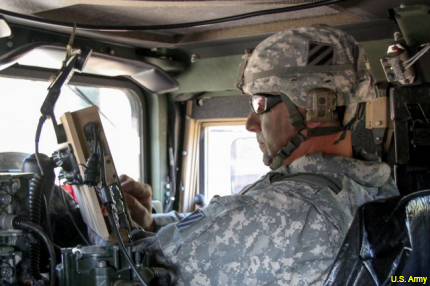Pentagon spending $100M to encrypt tactical communications
DISA awards Northrop Grumman a contract to install programmable encryption devices for the Joint Battle Command-Platform.

An Army soldier taps into the Joint Battle Command-Platform.
The Defense information Systems Agency will spend nearly $100 million to help secure a battlefield communications system used by joint forces.
DISA has awarded Northrop Grumman a $99.9 million contract for KGV-72 Type I Programmable Inline Encryption Devices, or PIEDs, to process classified messages across the Joint Battle Command-Platform (JBC-P), a situational awareness and friendly force tracking system that expands on a similar system used in Iraq and Afghanistan.
The KGV-72 is a programmable encryption device made by Harris Corp. that is compatible with other Blue Force tracking systems and will be installed by Northrop.
JBC-P provides on-the-move digital command-and-control information for the Army, Marine Corps and Special Operations forces at the brigade and below levels. It builds on the Force XXI Battle Command Brigade-and-Below/Blue Force Tracking system that has been used in Iraq and Afghanistan, by adding a faster satellite network, a Google Earth-like interface and real-time chat rooms, according to an Army fact sheet.
Installed in tactical vehicles as part of the Mounted Family of Computer Systems, an interoperable hardware set that puts multiple mission functions onto one screen, JBC-P is being upgraded through an Android architecture called the Mounted Android Computing Environment, or MACE.
MACE lets government and industry developers work with the familiar, widely used Android platform to streamline tactical communications systems such as the On Demand Information Network, which helps make software-defined radios interoperable. For example, making the network adjustments to connect radios that aren’t preset to talk with each other can take several days or longer. ODIN is aiming to bring that down to a few minutes.
Seamless communications is important, but so is secure communications. As the military shifts its focus from the Middle East to more technologically contested environments in Asia and elsewhere, it has been investing in encryption as a way to protect communications.
Northrop’s contract is for five years with five one-year options. DISA estimates that the work will be completed in November 2020.